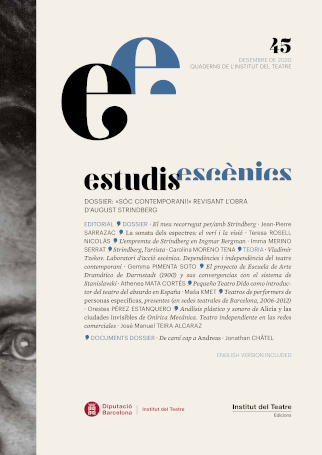«La sonata dels espectres»: el verí i la visió
Paraules clau:
Strindberg, subjectivisme, identitat, referencialitat, il·lusióResum
L’obra d’August Strindberg dinamita el drama per representar el procés de destrucció de sentit i el seu contingut residual. Si en el drama tradicional el sentit transcendent era una part essencial de l’obra, en Strindberg, aquest sentit —un aspecte que garanteix la unitat i la coherència— queda en suspens. Així, les seves obres de cambra s’aniran desposseint gradualment del seu instrumental i de les seves convencions dramàtiques: pràcticament no hi ha situació, acció, conflicte, o gruix psicològic dels personatges. Precisament, La sonata dels espectres mostra una clara pèrdua de referencialitat, de l’exterior a l’interior, a mesura que avancem en els seus tres moviments, inaugurant una tendència al subjectivisme. La informació proporcionada resulta esbiaixada i la percepció de la realitat, des d’una altra mirada, provoca una estranyesa de la quotidianitat, així com una suspicàcia sobre la configuració de la identitat moderna.
L’objectiu d’aquest article és, doncs, fer una lectura hermenèutica de La sonata dels espectres per intentar comprendre quins elements produeixen aquest desencaix respecte al drama del seu moment, i com aquests processos segueixen presents en la dramatúrgia d’avui.
Referències
Ekman, Hans-Göran. Strindberg and the Five Senses. Studies in Strindberg’s Chamber Plays. New Brunswick (NJ, EUA): The Athlone Press, 2000.
Esslin, Martin. The Theatre of the Absurd (1961). Londres: Penguin Books, 1967.
Kafka, Franz. Diaris: 1910-1923. Traducció de l’alemany de Francesca Martínez. Edició original: Tagebücher, 1910-1923 (1949). Barcelona: Edicions 62, 1988.
Robinson, Michael. «Introduction» i «Explanatory Notes». A: August Strindberg. Miss Julie and Other Plays. Traducció del suec de Michael Robinson. Oxford i Nova York: Oxford University Press, 1998, p. vii-xxxvi i 287-313.
Sarrazac, Jean-Pierre. Poétique du drame moderne. De Henrik Ibsen à Bernard-Marie Koltès. París: Éditions du Seuil, 2012.
Sarrazac, Jean-Pierre. Strindberg, L’Impersonnel. Théâtre et autobiographie. París: L’Arche Éditeur, 2018.
Strindberg, August. Un somni. Traducció del suec de Jem Cabanes. Edició original: Ett drömspel (1902). Barcelona: Institut del teatre de la Diputació Barcelona / Edicions del Mall, 1984.
Strindberg, August. Miss Julie and Other Plays. Traducció del suec, introducció i notes de Michael Robinson. Oxford i Nova York: Oxford University Press, 1998.
Strindberg, August. El viatge de Pere l’Afortunat. La més forta. Dansa de mort. La sonata dels espectres. Escrits sobre teatre. Traducció del suec de Carolina Moreno i Feliu Formosa. Barcelona: Comanegra: Institut del Teatre, 2017.
Szondi, Peter. Teoria del drama modern (1880-1950). Traducció de l’alemany de Mercè Figueras. Edició original: Theorie des modernen Dramas (1880-1950) (1956). Barcelona: Institut del Teatre de la Diputació de Barcelona, 1988.
Törnqvist, Egil. Strindbergian Drama: Themes and Structure. Estocolm i Atlantic Highlands (NJ, EUA): Almqvist & Wiskell International, 1982.
Törnqvist, Egil. Strindberg’s The Ghost Sonata. Amsterdam: Amsterdam University Press, 2000.














